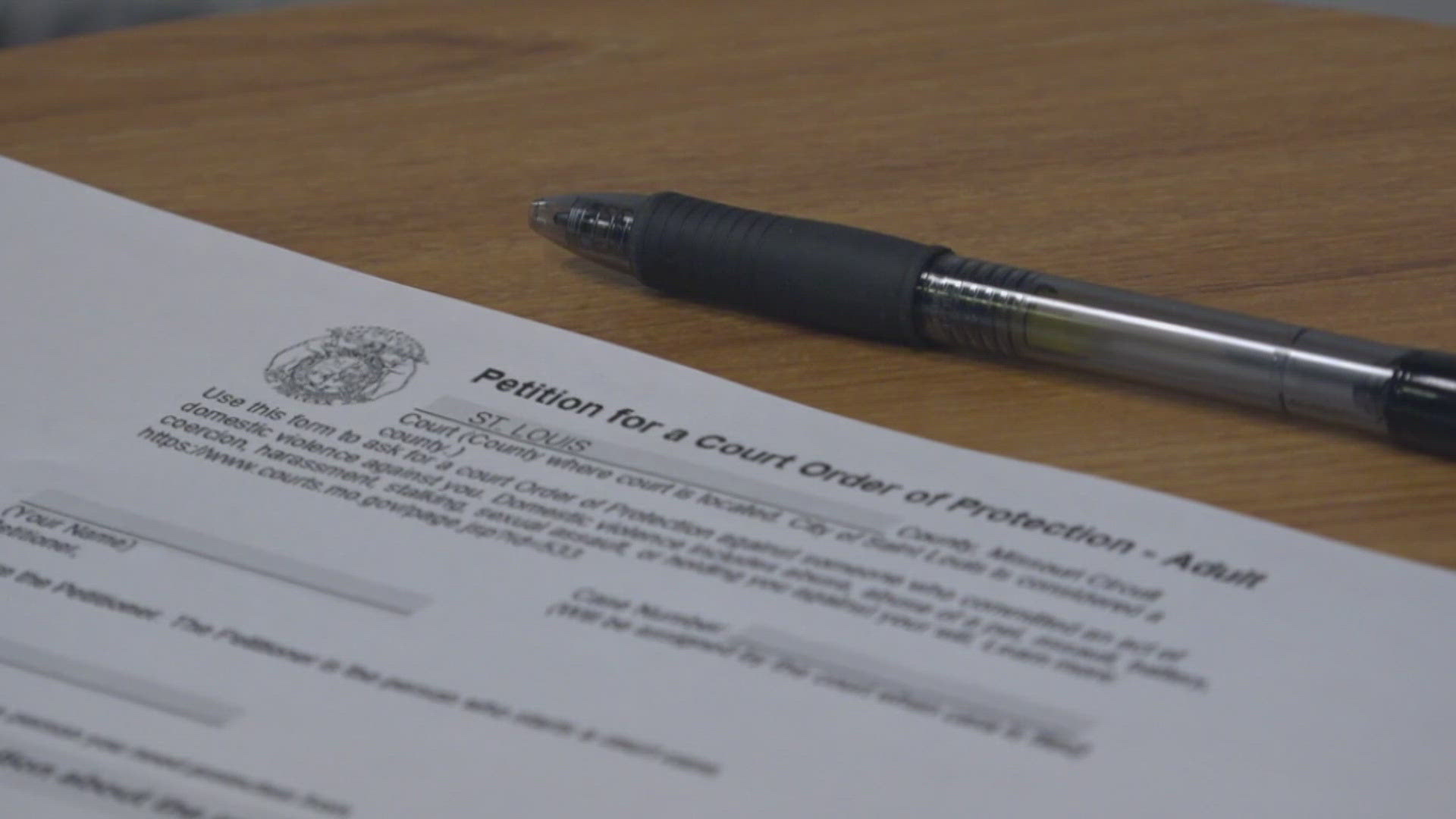ST. LOUIS COUNTY, Mo. — A St. Louis County retired judge found a new way to help victims and survivors of domestic violence.
With Michael Burton's expertise, he's created a nonprofit called St. Louis Survivors Legal Support. It's a way to guide people, showing them how to properly file orders of protection and gain relief in the process.
The nonprofit just celebrated its first year. The organization took in its first clients in April 2023.
Burton is the founder and executive director. He was a judge on the St. Louis County Circuit Court bench for 22 years. After serving as the Court's presiding judge, he retired from the bench in August 2021.
But he's still hard at work in his dedication to decreasing domestic violence.
"I knew that I wanted to do something that pertained to domestic violence victim advocacy," he said. "As a judge for 22 years, I saw on an hourly basis how difficult it was for victims of domestic violence to navigate the system on their own."
It was his time as a judge where he found some flaws.
"I heard thousands of cases involving domestic violence. I would read in the files about significant allegations and the petitioner, the victim that was filing for an order of protection, would not appear in court and I had no choice but to dismiss her case," he said.
Burton started to look at the statistics.
He learned that 80% of cases in St. Louis City and County are dismissed for several reasons. Burton said beyond that, a majority of the 20% who do show up, lack an attorney.
Burton shared these reasons on why cases may be dismissed:
- Real challenges in tracking down the respondent and if they can’t serve the accused abuser after several attempts, the judge will have to dismiss the case
- The victim won't show up to court because the respondent will do whatever they can for the petitioner to not appear
- The intimidating process for the petitioner
- If a petitioner has support, they are going to be much more likely to appear in court
- The statistics show if a petitioner has an attorney, they will be three times more likely to prevail
"If someone was in that position discussing about the most traumatic situation in their life, it's bad enough the abuser is 10 feet away but the fact that abuser has counsel, it's very intimidating and many of these folks do no appear," Burton said. "No one should walk into a courtroom alone, they need support."
Tali Katz is the nonprofit's director of legal advocacy and was a former domestic violence prosecutor in Nashville, Tennessee.
Katz said, "I prosecuted crimes related to domestic violence and in that capacity, I was handling cases after the worst had happened. Now working at St. Louis Survivors Legal Support where we can intervene much earlier in the cycle of violence and try to help people before the worse happens, for me, it’s very empowering."
Her new role still fulfills that passion.
"St. Louis Survivors Legal Support is saving lives," she said. "Less than 10% of intimate partner violence is reported, this is just the tip of the iceberg."
Katz said an order of protection is more than a piece of paper.
"It can do much more than that. It can grant custody, it can require supervised visitation if they have children in common, it can require financial support," she said.
Katz noted how domestic violence can affect children.
"We want to intervene before the next generation repeats it," she said.
It's not just these two doing the heavy lifting.
"At this time we have more than 150 volunteer lawyers that are assisting us in representing these petitioners and it’s still not enough," Burton said.
The organization also provides free training for attorneys and volunteers. They also hope to raise funds to hire staff full-time.
The program is carried by support, support to show victims they aren't alone.
"Orders of protection do work, when they are enforced and when the order has all the terms that are necessary to protect the victim. We've seen people turn their lives around," Katz said.
Burton shared results from the organization's first year:
- The organization has represented 200+ clients at no charge with the help of 150 volunteer attorneys and 20 volunteer advocates. Burton said they have prevailed on nearly all of their cases, except when the client chose to not go forward.
- The organization has ten police department partners, 15+ victim advocacy community partners, and recently two hospital systems partners - all as referral sources.
- The organization now has six staff members: the Executive Director; the Director of Client Services, who screens/interviews/provides resources to incoming victims; the Director of Client Advocacy, who connects clients to their volunteer attorneys; the Immigration Advocate, who accompanies immigrant victims through the order of protection process; the Outreach Advocate, who develops and maintains relationships with community organizations; and the part-time Development Manager, who researches and applies for grants.
- The organization provided more than 2,600 hours of specialized training to volunteer attorneys. This does not include the mentoring hours provided.
- The organization provided nearly 200 hours of specialized training to non-attorney volunteers.
What's next?
Burton said it will soon hire an Outreach Advocate/Specialist in Immigration Services (OASIS), an advocate who will connect first-generation clients with the legal services and needed resources.
The plan is to also hire an office administrator and full-time attorney to assist with the order of protection dockets as the referrals grow.
Connect with SLSLS
Katz said if a victim confides in you, she recommends listening to them and believing them.
"The greatest chance for lethality is when they try to leave, that’s not so they shouldn’t take that step but do it when they are safe to," Katz said.
St. Louis Survivors Legal Support dedicated helpline: 314-NOW-STOP (314-669-7867)
For their website on how to donate or seek assistance, click here.

